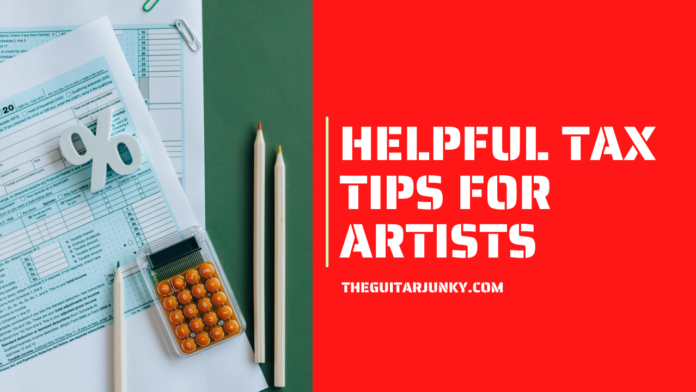Anyone who is deriving income from any activity is required by law to pay the correct taxes. This includes artists, such as musicians, singers, art gallery owners, painters, and everyone else in the arts and entertainment industry.
Every year, the law requires us to file for our taxes and pay the government our share of keeping all public systems and infrastructure fully functional. So, how can artists make good on their tax duties? Here are 10 tax tips that any artist will find very useful.

-
Contents
Define The Business
This is one of the most important things any artist should always ask themselves when it comes to taxes. You should know that the government has very different tax requirements, depending on whether the ‘source of income’ is a legitimate business or a mere personal hobby.
If the primary reason for being an artist is to earn a living, then your gigs or events are for-profit or business-oriented. The government is more open and generous to businesses. You can always offset your losses or even your expenses if you’re a business. For example, if you buy a very expensive equipment or build a studio for your business, then you can file these as deductibles on your income tax return.
You can never do these things if your being an artist is only a hobby. You may still be able to deduct expenses from your income. However, you will only get to deduct a certain portion of your expense.
-
Be Knowledgeable about Your Tax Obligations
Many artists, especially those who are only beginning in the industry, are often confused as to what constitutes their tax obligations. We know that all our income should be filed or reported to the government. This is regardless of the source of our income. It can include the income you derive from performing in shows. And if you have a regular day job aside from being an artist, then you will also have to report that as a source of income.
What complicates things is that your state and your city may have a very different set of requirements. And if you’re an artist deriving income from your gigs or events, then the IRS will classify you as “self-employed”.
In such cases, the IRS will expect you to pay your income tax and your self-employment tax. The income tax is that kind of tax that all of us must pay as our share for keeping public services open and running. The self-employment tax will go to your Medicare and Social Security as per provisions of the Federal Insurance Contributions Act.
-
Consider Getting the Services of a Tax Consultant

It is easy for artists to miss one of the minimums of two types of taxes that they should pay if they are ‘self-employed”. If they happen to be employed by a business as artists, then there are other things that they should be wary about.
For example, the Tax Cuts & Jobs Act that the government signed into law in 2019 now prevents artists employed by businesses to deduct business expenses from their income taxes. If you buy an expensive musical instrument or an equipment necessary for your events, then you cannot expect your business employer to deduct this for you.
What we are saying here is that managing your taxes can be very confusing. That is why it is always a good idea to hire a tax consultant right from the beginning of your career as an artist. It does not matter if you’re only a small-time, small-town player. The knowledge and wisdom of a tax professional can help you gain a better understanding of how taxes work and what your tax obligations are.
-
Stay Updated with IRS Measures
The federal government enacted a relief package that is worth $2 trillion in March as part of the “Coronavirus Aid, Relief, and Economic Security Act”. This allowed everyone to enjoy a very early tax credit in the form of stimulus payments. There are also grants that artists can take advantage of.
Another measure that came out from the CARES Act was the postponement of the deadline for the filing of income taxes. Every year, we are supposed to file our taxes on or before the 15th of April to the 15th of July.
Given that the tax measure was announced at a time when the government was still optimistic about a short COVID-19, some states are extending other favorable tax measures to their constituents. You should check with your local or state revenue department for any updates.
-
Always Set Aside at Least a Third of Your Gig’s Net
If you are earning a substantial amount from your events, it is often wise to expect that your taxes will also be substantial. A good advice to heed is to save at least 30 percent of your earning for each gig that you have. This will give you enough cash on hand when the time comes for filing your income tax returns.
If this is not possible, then try to save as much as you can from all your gigs. It would also help to file and pay your taxes on a quarterly basis, instead of annually. This will help you have a better grasp of your incomes and expenses.
-
Make a Very Detailed Record of Your Incomes and Expenses

Always have a ledger or a simple record book with you. You don’t have to be an accountant to do this. Think of it as an income and expense tracker. There are also mobile apps that can help you in this endeavor.
You will have to put entries into it every single day. However, it is best to keep all the information limited only to those that pertain to your business as an artist. You can list a lunch that you paid for when you met a music record executive as a deductible. Having dinner with your loved ones is something you should never list as a tax deductible.
-
Compute for Your Gross Income Derived from Your Gigs
Computing for your gross income should be easy. Equally important are the forms that you need to use. Freelancers or those who are not employed by a single business should fill up the W-9 form and give this to the business who is going to pay you for your event. If you are not a US citizen performing a gig, you will need a W8-BEN form.
The person or business paying for your gig will give you a 1099-MISC Form. This is only applicable for gigs that are worth at least $600 or royalties worth at least $10. Make sure to put your income in Box 7 of the form, under “Nonemployee compensation”.
Artists employed by a business should fill up a W4 form. In turn, the business will give you a W2 Form.
-
Compute Your Expenses
If you are self-employed, then you need two forms: Schedule-C and Schedule-SE. Make sure to deduct only those items that are deemed deductible by the IRS. For example, you can only deduct 50% of your business-related meals. Business-related purchases entitle you to a 100% deduction on fees and interests.
The following are examples of items that you can deduct from your income.
- Instruments and equipment, including their repairs and maintenance
- Instrument consumables, sheet music, and other music-related literature
- Instruments insurance
- Expenses incurred during gigs and performances, including meals and travel expenses
- Rental of spaces necessary for the conduct of the business
- Registration and copyright fees
- Fees for hired professionals
-
Compute Your Net Income
Deduct the total amount of your expenses and deductibles from the total amount of your income to determine your net income. As a business, the IRS will want to see if you are making a profit (or not). That is why it is always a good idea to seek a tax professional or an accountant to balance your books.
Freelancers need to submit Form 1040. This is the most common form that musicians and other artists use. The form allows you to include information about your royalties and freelancing gigs.
Form 1040EZ is for artists employed by a business and those who do not have dependents. If you have dependents, then you need Form 1040A.
-
Always File Your Income Taxes; No Ifs, No Buts
Whether or not you made money from performing at events or gigs, you should always file your income tax. This is true even if your annual income is less than $400. Normally, people with an annual income of no more than $400 are no longer required to file their tax return.
In Conclusion

Filing your taxes even when you are not required to do so can get you some tax advantages in the future. Let us say that we will be able to weather the COVID-19 pandemic and gigs start picking up again by next year. You can rest assured that your taxes will be lower in 2022 even if you made substantial earnings in 2021.
Filing your taxes should not be a very challenging experience. The pieces of advice that we shared in this article should help you feel more confident about paying taxes. This goes to show that you are not just any other artist trying to earn a living. You are a law-abiding one, too.
